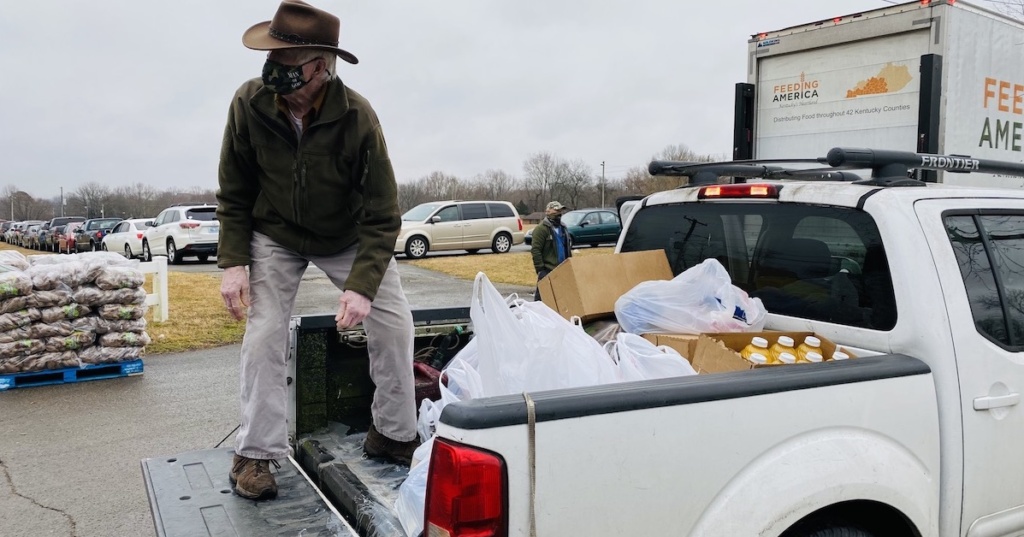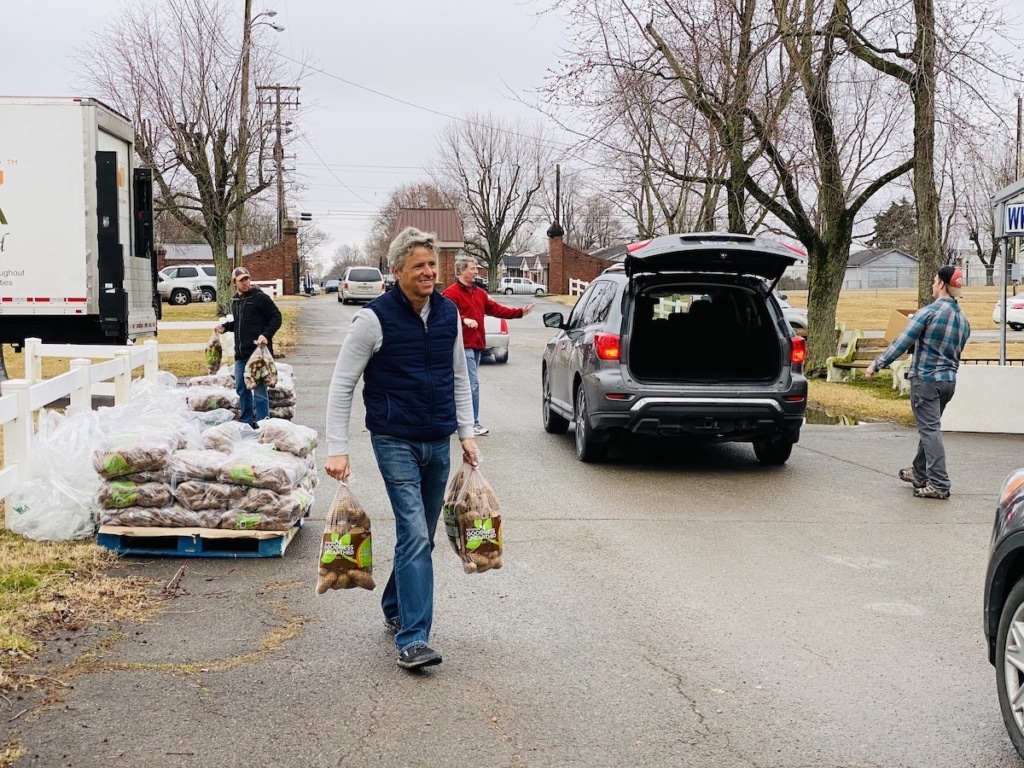Barbara Stevens didn’t need food for herself, but last Saturday she waited in a long car line that weaved through a soggy field at the fairgrounds. Ahead of her, next to the old convention center, a few dozen volunteers filled hundreds of cardboard boxes with canned meat, dry beans, juice, raisins, potatoes and frozen blueberries.

When it was her turn, Stevens eased toward the head of the line and someone shouted to the next volunteer that she was picking up food for 14 families. They quickly filled her Ford Explorer with boxes. Someone tapped the back of the SUV, and off Stevens went to make deliveries to her neighbors on West Seventh Street, Fowler Avenue and McPherson Street.
It’s a routine she observes one Saturday a month when Aaron McNeil House arranges for a Feeding America truck to deliver several thousand pounds of commodities to Hopkinsville.
“I’ve got it down to a science,” Stevens says. She checks with several people the night before to see who needs food and then she calls again the next morning as she’s leaving the fairgrounds to say she’s on the way to their homes.
Stevens, 54, is a geometry teacher at Christian County High School, where she’s been on the faculty for 17 years. Her work provides a kind of stability she doesn’t take for granted because there was a time when she needed this kind of help.
“I came from a very poor family,” says Stevens, who grew up in Maryland.

She moved to Hopkinsville as a young adult and spent years in public housing before earning her GED diploma with encouragement from a woman she met through the First United Methodist Church. That step led to a community college scholarship, then to her bachelor’s and master’s degrees while raising four children.
Stevens has a connection to several families through the Westside Neighborhood Association, one of four residential organizations in the Hopkinsville Inner-City Residential Enterprise Zone. She is the treasurer for Westside.
When the pandemic shut down neighborhood association meetings, Stevens still checked on people to see how they were doing. Many of them are seniors, a group that she believes is often overlooked.
That kind of connection might not have existed without the neighborhood association. It’s given Stevens a better understanding of families around her, including some who have custody of grandchildren and great-grandchildren.
“We are out of touch with seniors in this town,” Stevens says. “We should be paying a whole lot more attention to our seniors.”
She knows many older residents have been afraid to leave their homes during the pandemic. Others are uncomfortable accepting food from people they don’t know as well as a neighbor like Stevens.
Volunteers are key to monthly food distribution
Every month, usually on the second Saturday, a Feeding America truck delivers at least 15,000 pounds of food to the fairgrounds for Aaron McNeil, a nonprofit, crisis relief agency. During spring and summer when fresh produce is available, the weekly delivery can top out at 25,000 pounds.
The food is free through The Emergency Food Association Program, a U.S. Department of Agriculture initiative.
Aaron McNeil director Kurt Anderson said the local agency pays $225 for delivery. It amounts to pennies per pound for the food.
Anderson said he orders enough food every month to feed up to 850 families. Before the pandemic began last year, he was ordering supplies for about 450 families.
After the food arrives, it takes at least a few dozen volunteers about three hours to pack and distribute it all.
“I think it’s important for folks to know if we didn’t have the volunteers, it couldn’t be done,” Anderson said.
Aaron McNeil has two employees. It is run from an old church building at Second and Campbell streets.
Several local churches provide workers to help distribute the food at the fairgrounds. Businesses, clubs, elected officials and individuals also help.
Four or five groups each deliver food to 20 shut-ins, while others pick up boxes for a few neighbors, said Anderson.
Before the pandemic began, everyone had to show some proof of residency. But those restrictions were lifted to prevent spreading the virus while handing IDs and papers back and forth.
Oak Grove has a similar food distribution program through USDA and Feeding America.

Food insecurity affects many in Hopkinsville
Aaron McNeil also operates a small food pantry at its office that local residents can use during the week. A family of three may receive up to three bags of food every 60 days.
That’s a small amount of food considering how much food most families of means buy every week at the grocery, said Anderson.
Many families in the community “are constantly worried about food” despite the fact that most of them have a dependable but small income stream, either through low-wage jobs, public assistance or Social Security retirement or disability. The problem is they don’t have enough money to stretch through the end of every month. Many are seniors, he said.
Feeding America defines food insecurity as the inability to provide enough food for every person in a household to be active and healthy.
Food insecurity can have serious health complications, damage a child’s learning ability and force seniors to make tough choices, such as whether to buy food and pay for healthcare, Feeding America says.
Anderson says he doesn’t see people “scamming the system” when they come to Aaron McNeil for food, either through the pantry or the monthly USDA commodity distribution. They come because they don’t have enough money to buy food.
Jennifer P. Brown is co-founder, publisher and editor of Hoptown Chronicle. You can reach her at editor@hoptownchronicle.org. She spent 30 years as a reporter and editor at the Kentucky New Era. She is a co-chair of the national advisory board to the Institute for Rural Journalism and Community Issues, governing board president for the Kentucky Historical Society, and co-founder of the Kentucky Open Government Coalition.





